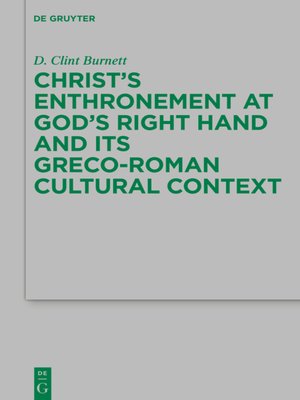Christ's Enthronement at God's Right Hand and Its Greco-Roman Cultural Context
ebook ∣ Beihefte zur Zeitschrift für die neutestamentliche Wissenschaft
By D. Clint Burnett

Sign up to save your library
With an OverDrive account, you can save your favorite libraries for at-a-glance information about availability. Find out more about OverDrive accounts.
Find this title in Libby, the library reading app by OverDrive.



Search for a digital library with this title
Title found at these libraries:
| Library Name | Distance |
|---|---|
| Loading... |
Given the dearth of non-messianic interpretations of Psalm 110:1 in non-Christian Second Temple Jewish texts, why did it become such a widely used messianic prooftext in the New Testament and early Christianity? Previous attempts to answer this question have focused on why the earliest Christians first began to use Ps 110:1. The result is that these proposals do not provide an adequate explanation for why first century Christians living in the Greek East employed the verse and also applied it to Jesus's exaltation. I contend that two Greco-Roman politico-religious practices, royal and imperial temple and throne sharing—which were cross-cultural rewards that Greco-Roman communities bestowed on beneficent, pious, and divinely approved rulers—contributed to the widespread use of Ps 110:1 in earliest Christianity. This means that the earliest Christians interpreted Jesus's heavenly session as messianic and thus political, as well as religious, in nature.







